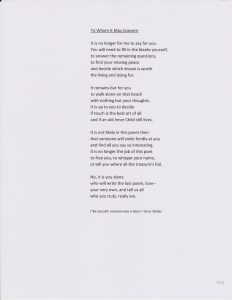Poems are mirrors of life experience, others, the world. People who come to poetry readings, for instance, are often looking for something; for example, confirmation of common feelings, common ground. Often they come for information to hear what others have observed and recorded.
Two other things sought are 1) to be touched by words/by someone else and 2) to recover missed/missing feelings such as the feelings of childhood, youth, or young adulthood.
Poetry performs services for others and, at a reading for instance, there is an expectation that listeners will be welcomed, and possibly flattered, understood, and appreciated. Others will come for answers to their life problems and questions.
Although the poet or reader shares of him/herself and has written poems that reveal him/her deeper feelings, moods, and opinions, there is always room for the listener to find him/herself likewise in what is recited and to respond in kind. As with all writing, reader response (c.f. Louise Rosenblatt for more on this) remains at least 50% of whatever sharing. Each listener or reader is entitled to learn something about themselves and to extend the process creatively, as well.


